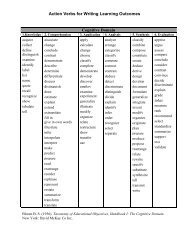ITF - UTSA Provost Home - The University of Texas at San Antonio
ITF - UTSA Provost Home - The University of Texas at San Antonio
ITF - UTSA Provost Home - The University of Texas at San Antonio
You also want an ePaper? Increase the reach of your titles
YUMPU automatically turns print PDFs into web optimized ePapers that Google loves.
<strong>ITF</strong> Evalu<strong>at</strong>ion Study, 2010 12D<strong>at</strong>a analysis<strong>The</strong> method used to analyze consensus building d<strong>at</strong>a was constant compar<strong>at</strong>ive. In thismethod, each researcher constantly compares d<strong>at</strong>a codes (specific words and phrases) andgroups them into c<strong>at</strong>egories and subc<strong>at</strong>egories (Glaser & Strauss, 1967). To help focus theconsensus building, we began d<strong>at</strong>a collection and analysis within the four c<strong>at</strong>egories (scholars,research, study abroad, curriculum) (Miles & Huberman, 1994). As new d<strong>at</strong>a were collectedfrom each group, we compared the first set <strong>of</strong> d<strong>at</strong>a with the new d<strong>at</strong>a. <strong>The</strong>se comparisons theneither confirmed the c<strong>at</strong>egories or led to new c<strong>at</strong>egories (e.g., contextual). This recursiveprocess continued until d<strong>at</strong>a collection was complete and no new c<strong>at</strong>egories were detected.FindingsA summary <strong>of</strong> the key findings from the cross-case analysis are <strong>of</strong>fered below.Scholars<strong>The</strong> c<strong>at</strong>egory <strong>of</strong> student scholars had a focus on intern<strong>at</strong>ional students withrecommend<strong>at</strong>ions for more effective means for evalu<strong>at</strong>ion and gre<strong>at</strong>er support (coursework,research, pr<strong>of</strong>essional development, scholarships) <strong>of</strong> intern<strong>at</strong>ional students. <strong>The</strong>recommend<strong>at</strong>ions regarding faculty scholars included the facilit<strong>at</strong>ion <strong>of</strong> collabor<strong>at</strong>iveopportunities for faculty exchange, collabor<strong>at</strong>ive real-time teaching across institutions, andsupport for campus family scholar housing.Research<strong>The</strong>re was one recommend<strong>at</strong>ion regarding intern<strong>at</strong>ional research—raising awarenessthrough research fairs. <strong>The</strong> majority <strong>of</strong> the recommend<strong>at</strong>ions focused on global research—establishing cooper<strong>at</strong>ive arrangements among faculty, student, and staff for research exchange;supporting interdisciplinary approaches to research; developing research projects focused onglobal issues or problems; and encouraging and supporting joint research endeavors. Inaddition, there was discussion about exchange use <strong>of</strong> research facilities with intern<strong>at</strong>ionaluniversities.Study AbroadStudy abroad was mentioned more frequently in the student group than in the facultyor staff/administr<strong>at</strong>or groups. Even so, study abroad received less focus than the otherc<strong>at</strong>egories perhaps due in part to the fact th<strong>at</strong> study abroad is already institutionalized, orbecause study abroad is considered unaccessible by our largely commuter and non-traditionallyaged student popul<strong>at</strong>ion. <strong>The</strong> focus <strong>of</strong> recommend<strong>at</strong>ions was on collabor<strong>at</strong>ion (increasecollabor<strong>at</strong>ion among departments and colleges in study abroad efforts and establishcooper<strong>at</strong>ive arrangements among faculty, student, and staff for study abroad) and funding (donot assume all students will be able to be funded to study abroad).CurriculumC<strong>at</strong>egories under curriculum included program <strong>of</strong> study, interdisciplinary, corecurriculum, foreign language, awareness and engagement, and communic<strong>at</strong>ion. In essence,students, faculty, staff/administr<strong>at</strong>ors recommend identific<strong>at</strong>ion <strong>of</strong> courses with a global focus(program <strong>of</strong> study); identify global themes and develop problem-focused classes th<strong>at</strong> studyglobal issues or problems, and develop an interdisciplinary major in intern<strong>at</strong>ionaliz<strong>at</strong>ion(interdisciplinary); infuse global themes in and across core curriculum (core curriculum); have astronger focus on foreign language study (foreign language); encourage awareness <strong>of</strong> andengagement with intern<strong>at</strong>ional and global curriculum development and seminars



